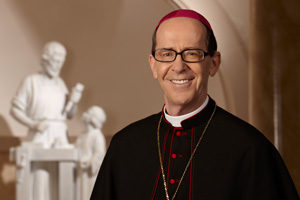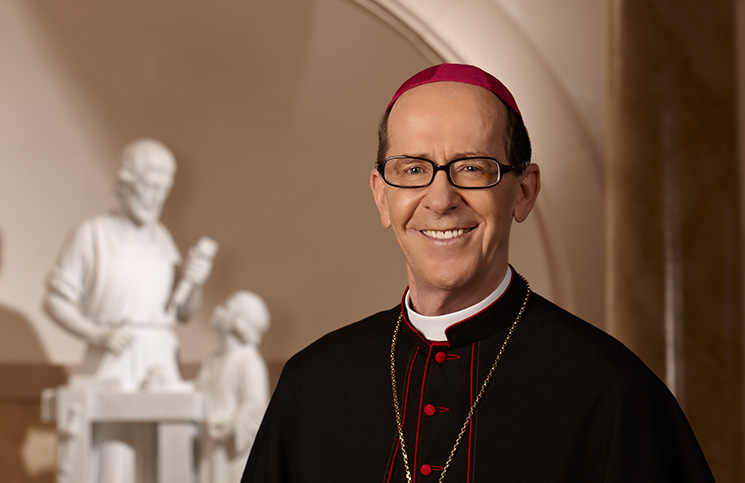Fifth in a series

[dropcap type=”4″]F[/dropcap]ive hundred years ago, in AD 1515, a man was born whom the world would come to know as the Apostle of Rome and one of the Church’s funniest saints. In an age that badly needed holy men and women to rise above the spiritual squalor, and needed reformers among its priests to counteract clerical corruption, he is known not only for his holiness but also for his humor. While the Council of Trent (AD 1545-1563) was addressing the scandalous confusion of the Protestant Reformation, he was winning friends by his contagious delight in the Gospel of Jesus.
The secret to St. Philip Neri’s impact on the City of Rome, and cities and villages far beyond, was his keen awareness of the greatest roadblocks to finding happiness in life.
Impediments to joy
The Catechism of the Catholic Church lists five impediments to joy: indifference, ingratitude, lukewarmness, spiritual sloth and hatred of God (CCC 2094). Many people in the 16th century, as today, failed to grasp the wisdom of this teaching, and thus failed to recognize the holiness of Philip Neri. But it mattered little to him whether he was laughed at or laughed with; what mattered was helping others to discover how virtue and laughter walk together hand-in-hand. So, let’s consider briefly what the Catechism has to say about hindrances to happiness.
“Indifference neglects or refuses to reflect on divine charity” (Ibid). The charity of God is a wondrous reality; so immense that it bridges the temporal with eternity. The Psalms repeatedly sing of the mercy of God to help us overcome our slowness of heart. So it was that the Apostle of Rome encouraged young musicians like Giovanni Pierluigi da Palestrina to compose sacred music that lifted the soul to awe and wonder at the beauty of the Lord and His creation.


Secondly, “Ingratitude fails or refuses to acknowledge divine charity and to return Him love for love” (Ibid). Philip Neri would readily agree with Mother Angelica, “Unless we are ready to do the ridiculous, we cannot expect the miraculous.” For those who do not believe in God, worship seems ridiculous, the Ten Commandments look like the opposite of the way to freedom, and Humanae Vitae is labeled a war on women; but to us who believe in Jesus, these are expressions of the charity of God. St. Paul put it this way (1 Cor 1:18), “The message of the Cross is foolishness to those who are perishing, but to us who are being saved it is the power of God.”
‘The merriest man alive’
Thirdly, “Lukewarmness is hesitation or negligence in responding to divine love; it can imply refusal to give oneself over to the prompting of charity” (Ibid).
The poet Phyllis McGinley called Philip Neri “the merriest man alive” during the troubled times of the Protestant Reformation and Catholic Counter-Reformation. He was a man of mirth because he delighted every day in the wondrous love of God. He took time to notice and to praise God for His charity in all His dealings with the human family. From experience, this saintly priest knew how easy it is to overlook the goodness of the Lord, to fall into a steady diet of pessimism, and to succumb to self-pity; so he fought with dynamic stamina of soul and a smile on his face against this and the other four impediments to joy.
Fourthly, “Acedia or spiritual sloth goes so far as to refuse the joy that comes from God and to be repelled by divine goodness” (Ibid). Once the heart closes itself off to the joy and splendor of the Lord, it becomes radically disoriented with regard to its own identity. This disorientation all too easily slips into belligerent opposition to the things of God and animus against His faithful followers. This is why the person who delights in the Lord at all times, like St. Philip Neri, stands in contradiction to those who refuse to see in themselves the image and likeness of God and who despise those who do so. In other words, as the Catechism teaches about the fifth opponent to joy, “Hatred comes from pride. It is contrary to love of God, whose goodness it denies, and whom it presumes to curse as the one who forbids sins and inflicts punishments” (Ibid).
Founder of the Oratory
In order to share his happiness with others and to bear even more convincing witness to the joy of the Gospel, St. Philip Neri, at the urging of his confessor, accepted ordination as a priest and soon became well-known as an outstanding confessor. He had the gift of being able to see through the pretenses of penitents and, with charity and even humor, lead them to genuine conversion.
Gradually, a number of men seeking holiness of life were attracted by his gladsome way and formed a community around him in which they shared all things in common. Some of these followers eventually joined with him in founding what he called the Oratory, a Clerical Society of Apostolic Life. While not a religious institute, it is comparable in many ways, having the traits of common life, common prayer, and mutual encouragement of one another in the service of God and neighbor.
In an age of irony and sarcasm, St. Philip Neri was a sign of contradiction just because he was happy, always rejoicing in the Lord and leading others to discover His joy. Since, deep down, every person wants to be happy, but often doesn’t know how, his cheerful demeanor moved many to ask, “What’s his secret?” His secret was a humble and grateful heart that loved God and served Him with good cheer. Could you and I not try to do the same?






![[VIDEO] Make Sunday feel like Sunday again](https://www.catholicsun.org/wp-content/uploads/2021/04/2021-YOUTUBE-BISHOP-MESSAGE-THUMBNAIL-ENGLISH-218x150.png)